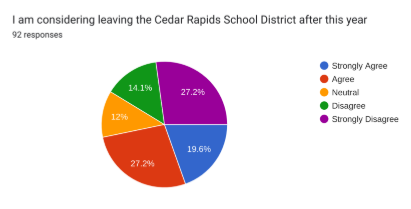
Lillie Dostal
Many teachers express mounting anxieties over the changes being introduced in the Cedar Rapids Community School District.
Nearly half of the teachers at Washington and Kennedy High Schools have considered leaving the district, according to a December 2024 survey obtained through a public records request by Iowa News Now. These findings show a troubling picture of low morale and rising frustration in the wake of ongoing district leadership turnover, curriculum overhauls, and district-wide staffing shifts. For many teachers, these changes aren’t just affecting their jobs, it’s taking away their sense of purpose.

The morale survey was created by all three Cedar Rapids Community School District High School principals after they began to notice similar patterns of low morale within their buildings. Ian LeMaster, principal at Washington High School, talked about the behaviors he has noticed in the building that motivated the creation of the survey, “You had more people that would just come up and come up to me with frustrations. Or exhaustion.”
This has not gone unnoticed by students either; Lexi Engel 25′ a student at Washington High School, cited an example in which one of her teachers expressed concern to their students about certain classes being cut in the next year. In another instance, a teacher colleague stormed into her instructor’s classroom, telling the teacher to check their email for changes being announced.
“It just seems like all their tempers just suddenly got short,” says Frannie Stilwell 25’, “It just seems like they’re angry for no reason.”
In the months following the release of the survey data it seems morale has not gotten better. Nadia Blake, who is a sixth-year teacher, described her school’s morale as “terrible.” Blake explains,
Teacher positions shifting throughout the district has further exacerbated the stressors caused by curriculum changes. Earlier this year in March, the district announced it would be making structural changes, which included, according to KCRG, “eliminating 27 full-time positions,” and moving some staff from their current building of employment to a different school within the district (referred to as “surplussing” by staff).
Next year, the Washington Science Department will lose two of their teachers (in addition to other teacher positions being cut at Washington). While the science department has enough teachers to cover the Biology classes, this bubble of students will eventually move into the Chemistry and Physics classes, with not as many teachers having the certifications to teach these courses.
“With the shuffling of teachers, I don’t know what I’m teaching next year, to be honest. There’s only a couple of classes that I can teach,” says Tessa Rayne, a third-year teacher in the district, referring to her own certifications.
With the number of students doubling in classes and the number of teachers reducing, there are still many questions about elective courses. Chris Rolwes, a Social Studies teacher at Jefferson High School, spoke at a school board meeting explaining, “There is still no clear plan for staffing these additional selections. As teachers are stretched to cover required courses, Juniors and Seniors may face a reduction in available electives, potentially resulting in more study halls or early dismissals due to staffing shortages students have been registering.”
While certain curriculum changes caused concerns among teachers, a majority of the teachers The Surveyor spoke to said they felt the district didn’t value their input on plans for upcoming years. Tom Bennett, a former teacher who worked in the school district for over fifteen years and recently left the profession, called the district’s communication “laughable.”
Blake echoes this statement, sharing that she “does not feel the district cares” about teacher input: “I think they like to say that they do… [the district] will say ‘We’re doing Instructional Empowerment [the district’s newly implemented Model of Instruction] because 45%¹ of teachers on our board said that they wanted to do more student-led activities.’ But I’ve yet to know or hear of anyone who has actually participated in any of these things.”
There is also a fear of voicing concerns due to the possibility of losing one’s job. Previously, Dr. Grover worked as the superintendent at Grand Island Public Schools in Nebraska. During her time, former Grand Island Mayor and Head Soccer Coach Jeremy Jenson leaked a survey revealing low morale within their district, resulting in him being fired by Dr. Grover.
Grand Island’s local news station, KSNB 4, reported on the specifics of his firing, quoting the district’s Communication Team stating, “Jeremy Jensen was fired after posting what Grand Island Public Schools deemed as confidential information regarding student survey results about school culture and climate.” However, KSNB 4 also notes, “The images Jensen shared on his Facebook page don’t reveal any student or staff names, nor does it reveal any personal information about them, but it did point to what appeared to be systemic issues within GIPS.”
When asking to interview the teachers for this article, all seven asked to remain anonymous². Many of them cited their fear of retaliation for speaking up, and some even warned of the repercussions of writing an article about this topic.
Rayne addressed early meetings about the College and Career Pathways saying, “I’ve heard… rumors. People who have been in the early meetings heard phrases like, ‘You’re going to get on board, or you’re not going to work here,’ or, ‘I’m going to make sure that I tell the district that you guys are totally on board.’”
Bennet shared similar experiences stating, “I know colleagues that have felt bullied by district staff for speaking out.”
When asking Zoey Whitman, an eighth-year teacher at Washington High School, about how the district responded when staff members spoke up, she pointed towards Principal Ian LeMaster’s decision to leave Washington High School after this year saying, “Why do you think Mr. LeMaster is leaving? Do you think he supports this? Could you go up there to parents and lie and say you support this?”
LeMaster responded directly to these claims saying, “The things we’re trying to implement— we’re talking about very massive changes. Changes that will be happening for years and years… [I asked myself] ‘With a little girl who’s going to be in Kindergarten… Can I miss a lot of [time at home to work]? Five years to ten years like that out of my life?’ That answer was just, ‘Absolutely not.’”
He later addressed his support for the College and Careers Pathways program saying, “I think the idea is good and I think the reason for why we’re going to that is good; I do believe that there is a reason for change,” citing decreasing district enrollment.
Many of the teachers interviewed struggle to trust Dr. Grover and whether the decisions she is making are being done to benefit students, with almost all of the teachers The Surveyor spoke to claiming Dr. Grover has financial ties to Instructional Empowerment and the Careers and Pathways.
“I feel like there’s some people, like money in people’s pockets, that are trying to push this through,” said Rayne. “People who are keynote speakers at events that are put on by this curriculum or people who have worked together in the past, in a previous district…I think someone’s getting a payout in some way, shape, or form. Because it doesn’t make sense. It doesn’t make sense to do this program in this district right now.”
While there is no public information about the ownership of Instructional Empowerment or National Career Academy Coalition (NCAC), Dr. Grover has most recently been a speaker at the NCAC conference hosted in Chicago on November 2024. It should be noted that the district covered teachers’ travel and lodging expenses to attend this 2024 conference, though it is unclear how these costs were ultimately covered.
With recent staffing cuts, many are beginning to question the financial decisions of this district as well. Chris Rowles, a social studies teacher at Jefferson High School talked to the school board saying, “I urge the board to closely examine staffing at the Educational Leadership and Support Center. Since August, the District administration has hired multiple administrative positions including three Communication Specialists, a Solution Strategist, a Director of Brand Communication, an Administrator to the Office of Superintendent, and an HR Manager at a combined cost of $523,000 along with the $450,000 spent on the District Management group’s consultation. Nearly $1 million has been allocated outside the classroom staff and community.”
With many positions being cut due to the district’s $12 million deficit, many teachers are questioning the superintendent’s salary. Dr. Grover is currently making $314,150 plus benefits in 2024. This was a 3% increase from the previous year, according to The Gazette. That is also almost two-times the average for superintendents in the United States. The School Superintendents Association’s latest survey shows that superintendents in the United States earn an average salary of $156,468 per year. Superintendents in similar sized districts within Iowa are also paid less, with the Iowa City Community School District superintendent, Matt Degner, making $249,491.
When speaking of the new district leadership, many reflect on the leadership of Noreen Bush and how involved she was. Rayne explained, “Noreen, she went to Jefferson. She knew a lot of people in the community and… she listened a lot.”
Blake shared similar sentiments: “It felt like [Noreen] really cared. Whereas, like now, it feels very impersonal. It feels very corporate… Student success starts with having teachers that care or are happy, and she cared about making teachers feel cared [for].”
Now with new initiatives being introduced, some question the necessity of these changes when other issues like attendance and behavior are still struggles for teachers. Rayne expressed her concern saying, “There’s questions about how [College and Career Pathways] is going to function in our district when we know that this is a program that requires everything to be functioning at its best. When we know that as a district, we’re having struggles with attendance.”
Sienna Cruz, a 12th-year teacher explains why some of these initiatives are being put into place: “If you’re an admin, you’re so disconnected with the actual classroom that you don’t know how to realistically think about a solution. It feels more like a factory approach and that feels more like corporations, and people aren’t products. I feel like we’re shifting to even more of a mass-production model. And I don’t like it. I think it stunts creativity and I’m worried about what it’s gonna do, especially our school and all of the really rich fine arts traditions, you know?”
When asked about how this will affect students, Cruz asked us, “Do you want to be a product?”
With many unknowns still facing electives and questions on how pathways will affect the arts, teachers are worried that students will miss out on what makes high school fun.
“I worry that emphasis on churning out laborers–churning out workers–is detracting from the high school experience of getting to know your peers from a common background or uncommon backgrounds; trying out theater, being on a team, and doing sports,” said Rayne.
With the district still struggling to make up the financial deficit, the school board asked community members to be in contact with state representatives to oppose the school voucher program.
During the school board meeting, many disagreed on what the cause of the recent stress in the district comes from, but Kevin Darrow, a Language Arts teacher at Jefferson High School emphasized the district’s preparedness.
However, following his talk to the board, other attendees urged speaking to representatives, mentioning Governor Kim Reynolds as a contributor to recent district issues.
When speaking with teachers within the district, opinions are still mixed on who should be held accountable, some blame the voucher program, however, Rayne argues that this is not the case, saying, “It’s the decisions by the administration of the district and the decisions by the school board and like however the school board is enabling them to sink money into this program, making changes that are not community supported, And I think it’s an attempt to try and convince the public to support the bond vote and kind of boost people’s political careers. But I don’t think so. We can say that Kim Reynolds has her thumb on us, but I don’t think that’s a clear explanation.”
EDITOR NOTE: As of May 19, 2025 The Surveyor staff has been in contact with Dr. Grover and her Communications Team regarding the content of this article. The Surveyor previously reported that there was no response from the district, however, it appears that initial attempts at contact did not reach Dr. Grover. This story will continue to be updated.
¹This is a number arbitrarily stated by Blake and does not reflect a legitimate statistic
²The following names were changed to protect teacher anonymity: Nadia Blake, Tessa Rayne, Sienna Cruz, Nora Miles, Zoey Whitman, Tom Bennett.
